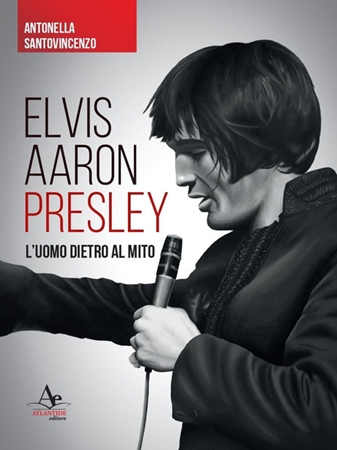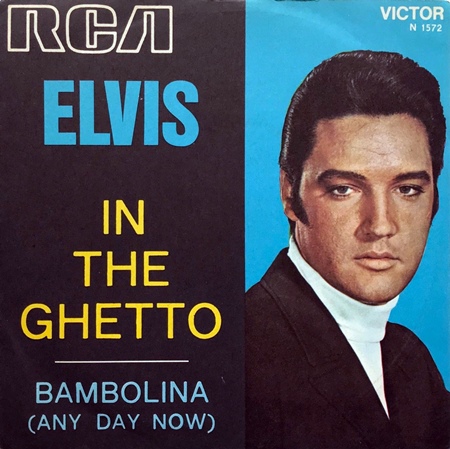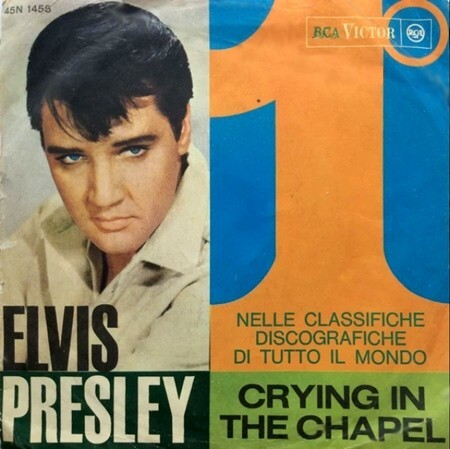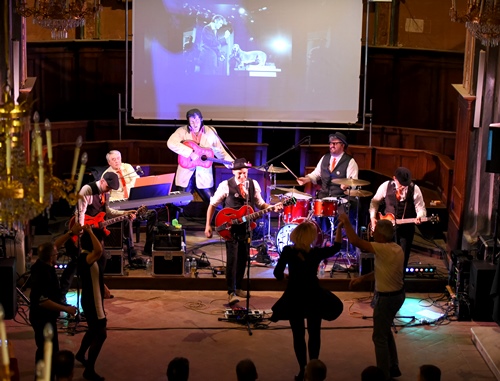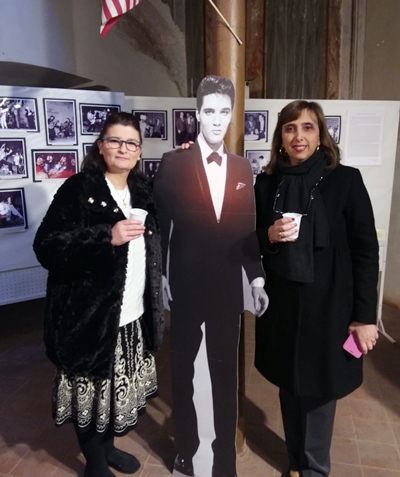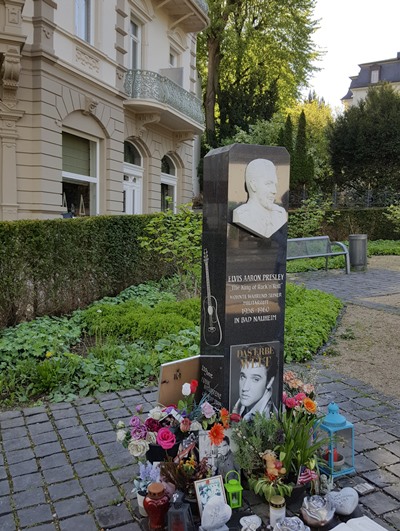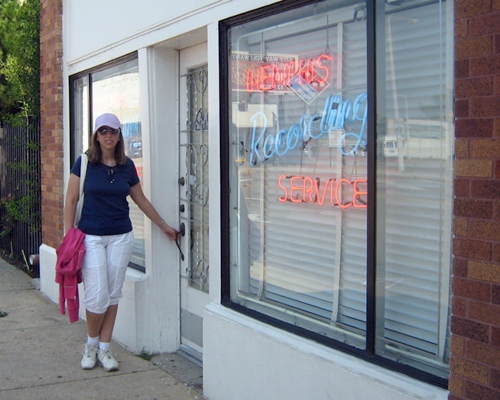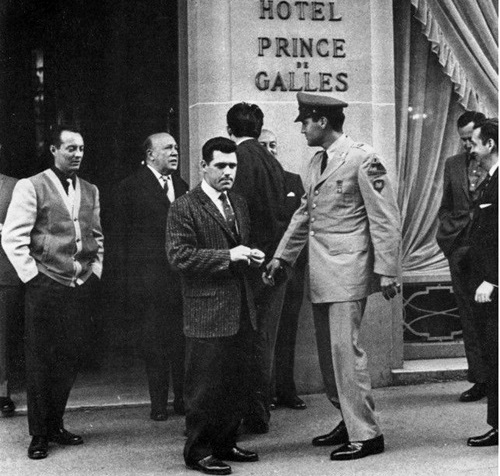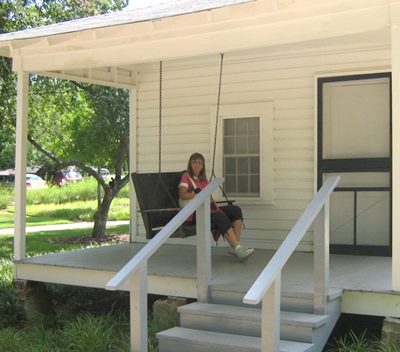 |
 |

In EIN’s latest interview with key Elvis representatives from around the world, we talk with author and Elvis researcher Antonella Santovincenzo who discusses Elvis' impact in Italy and her new book, Elvis Aaron Presley L’Uomo Dietro Al Mito. EIN: Antonella, it is great to talk to you about Elvis. Before we discuss your new book, please tell me about how you became an Elvis fan and your involvement in the Elvis world . AS: It’s a pleasure for me as well, being here to talk about my book and to share my passion for Elvis with you. It’s an honor for me that this interview is hosted by your website. The fact that you have readers from all over the world makes me feel like I am virtually hugging all of Elvis’ fans. And this is awesome, because when you love something, the thing that truly makes you happy is to be able to share it with those who can understand you and who can feel the same as you. Regarding my relationship with Elvis, in the introduction of the book I explain the uneven way in which he entered my life, then left and came back again during the course of years. Without spoiling too much of the introduction to the readers, I can tell you here that Joe Esposito was right when he said: “Once that Elvis touched you, you stayed with him for all of your life.” Maybe I didn’t fall in love with him right away, but he was surely destined to occupy an important place in my heart and in the right moment, he took that place. He arrived when he was supposed to, and from that moment I knew that it was forever. With him, who was for me a true gift from Heaven, and in the book I explain why, also came many friends, dear and precious, and many beautiful experiences, like the photographic exhibitions that we held in different places of Italy in 2020 before the COVID restrictions and the lockdown, introducing Elvis’ music and most importantly the infinite richness of his personality, together with the teachings that derive from his life, to people of all ages, be them Elvis fans or not. The most enthusiastic ones were teenagers, who had a chance not only to meet the artist, but also an extraordinary person that they never knew about, and this filled us with joy. Children are our future. It’s thanks to them if Elvis will live on even when our generation will no longer be around. We have to pass the torch.
EIN: Elvis had a love of Italian music, Mario Lanza being one of his idols. How popular has Elvis been in Italy? AS: Yes, Elvis really loved Italian music a lot. Among his favourite artists, aside from Mario Lanza and Italian-American artist, Dean Martin, there were also the great Caruso and Domenico Modugno. Ask Me, after all, is the remake of Io by Domenico Modugno, and It’s Now or Never a remake of O sole mio, by Caruso. But there’s another little gem, again by Caruso, Santa Lucia, that Elvis sings completely in Italian, with an impeccable pronunciation, without the classic accent that all American actors and singers make when they try to speak Italian. It must have taken him a lot of effort to get the pronunciation right, before even worrying about his interpretation. And this is another thing that, even if small, tells a lot about Elvis’ utter professionalism. Regarding how his figure was perceived in Italy when he was still alive, being unable to give you a personal witness due to the fact that I didn’t live much of that period (when Elvis died I was still a young kid), I will answer this question reporting the words of a very dear friend of mine, the writer Ernesto Zucconi, that wrote his own book about Elvis titled “Un Re per amico” (that can translate to “A King as my friend”). Ernesto is younger than Elvis by a few years. He remembers that .. “up until the mid-sixties, Elvis’ movies were regularly projected in the Italian cinemas and his records sold many copies. So much that Crying in the Chapel was the number one hit in Italy in the summer of 1965.
Further proof of how his fame extended itself to our country was given by the presence of a high number of Elvis impersonators, some of them more original than the others, that made a fortunate career out of imitating Elvis. Music magazines destined to youngsters, but also comic books, displayed pictures of Elvis on their front covers and filled pages with rich articles about him complete with pictures. After a few years in which his fame dulled (1966-1968), the interest of his Italian fans came back with In the Ghetto, followed by other great successes until the Aloha from Hawaii concert, broadcasted all over the world. The Italian RCA helped boost the hype by placing Elvis cardboard cutouts taken from the first show of the ‘68 Tv Special in all the major record stores, that up until 1977 never stopped displaying and advertising his latest discographic products. Newsstands were always well stocked with Elvis postcards."
Beat Circus - celebrating Elvis' music
Luca Castellino, member of the band (called ‘Beat Circus’) that held the concerts that wrapped up our exhibitions, a music lover and fellow Elvis fan, younger than me but that has many friends among the musicians of that time, remembers: “Whoever made music during those times knew that Elvis and Little Richards were the ones that brought a breath of fresh air in other otherwise rigid schemes that existed in Italy in the ‘50s. Everyone praised Elvis. They had this strong feeling of gratitude towards him because he changed the process of making music”. Italian press, on the contrary, criticized Elvis just like their American colleagues, accusing him of being the cause of youth delinquency, of the corruption of old time manners and of many other things. But over time they had to acknowledge his undeniable qualities as an artist. Elvis passed the test of time, making the world know that he was more than just a fleeting trend. “Elvis’ musical influence”, Luca goes on, “was so strong that, in 1965 Bobby Solo won the Sanremo festival with the song Se piangi, se ridi, that Bobby wrote, admittedly, copying the harmonic succession and part of the melody from Elvis’ It hurts me”. Elvis also had the chance to meet the Italian singer Rita Pavone, who appeared on the Ed Sullivan Show in ‘64, while they were both in Nashville to do some recordings, just like he had the chance to meet Italian actress Sophia Loren on the set of the movie King Creole. The singer Little Tony, instead, had the luck to attend one of Elvis’ concerts at the Madison Square Garden in 1972.
Antonella with friend Patrizia who curated the Elvis photographic exhibition in Boves
EIN: Has Elvis’ popularity held up until today in Italy? AS: Sadly, nowadays Italian media talk very little about Elvis, and if they do it is mostly to highlight the supposedly scandalous aspects of his life and of his death. Leaving in the shadows not only the most fascinating aspects of his person, but also his enormous musical talent. Our photographic exhibitions originated from our desire to counter this way of reasoning. We wanted to give back to Elvis that place that we think he should have in the history of music and of the 20th century’s culture, as the innovative and original artist that he was, as someone who, consciously or not, started an out-and-out cultural revolution, and above all, thanks to the most brilliant of its representatives, we wanted to bring attention to the contribution that rock-and-roll had in the abatement of the racial barriers in American society and abroad. I thank God that many fan clubs are still present in Italy nowadays, populated by people who sincerely love Elvis and appreciate not only his music but also who he was as a person, and that many of his admirers are youngsters. It’s not by chance, in fact, if in my book there is also an article written by a 22-years-old young man who explains what being an Elvis fan means to a millennial like him. EIN: You recently published Elvis Aaron Presley L’Uomo Dietro Al Mito. What gave you the idea to write an Elvis book? AS: The idea behind the book came little by little. Writing was always one of my greatest passions. But I never found a topic that attracted me enough to make me want to embark on such a complex task as to write a book about it. When Elvis came, he changed everything. He was an extroverted, expansive person who loved hanging out with people and who had a deep desire to communicate with others, to share with other people not only material things but also thoughts, life moments and feelings. Loving him will inevitably lead you to tell other people about him, you would want everyone to meet him, you wish that everyone could understand him and love him for what he truly was. That’s what led me to write the articles I made after visiting the places of Elvis’ life, reports that later got posted on the forum page of an Italian fan club, and the few articles I made for an Italian magazine where I used to write for the psychology section, with the hard task to talk monthly about Elvis’ personality, about his inner world and his true self. But above all, this is what inspired the introductions to the panels of the photographic exhibition, where we wanted people to get familiar with Elvis’ hobbies, his passion for Karate, his spiritual searches and many other aspects of his world. The book only reunited all of this in a frame that tied together the various steps of a single path, the one that I followed trying to get to know a person, started many years ago and still far from being over.
Visiting Bad Nauheim in Germany
EIN: What were some of the major things you learnt while writing and researching the book? AS: In a way, my research process didn’t begin from the start. It began from the end, from Elvis’ death, and then proceeded backwards. Fascinated by the mystery, or we’d better say the “supposed” mystery, regarding his death, I began looking for as much information as possible to try and answer a question that began swirling through my mind: “Who were you really, Elvis Aaron?”. He smiled, with that smile that seemed to tell me “I know much more than what I’m telling you”, and I accepted the challenge. I began searching more about the man behind that smile. I’ve been translating books from English to my language for 13 years now, even if there were periods in which, due to my activities as a teacher or due to my Theology studies, I had to completely abandon my translations. I never studied English in school. I can’t speak it. It’s very difficult for me to translate texts to my language. It can take me up to an hour to translate a single page of a book. And I translated books that are as much as 600 pages long, so you can imagine. Thank God, I am often able to count on my dear friend and fellow Elvis fan, Patrizia Tesser, whom I share the translation workload with. Without her I would have only done half of what I did so far. It took me years to buy those books, even some of the older ones that date back to when Elvis was still alive. I own a copy of all of the books written by his friends, his women, by the musicians who worked with him and by writers that chose to focus on particular aspects of Elvis’ life, such as his philanthropy. I have books that talk about his death and about the effect that it had over the American popular culture. A collection of almost one hundred books, and still growing. So far I’ve only translated a small fraction of them, but I want to keep up with my research until God will allow me to do it. There is still so much that I have yet to find out about Elvis, and things about him that I can expand my knowledge of, and my interest in him never fades in spite of the passage of time. What I’m trying to say is, Elvis never tires me. When it comes to the actual time that it took me to write the book, I think I could define its publication as the birth of a baby, because it took nine months to see the light, three of which were spent revising the text over and over to check all the information contained in it, which is a lot. If the reader will still find some little mistakes, little typos, I apologize for it. Sadly, in a text as lengthy as this one errors are almost inevitable, no matter the author’s good intentions. Not even university text books are exempt from mistakes. But the book contents overcame every test, because I thought through what I wrote an infinite number of times and I couldn’t be more convinced of the things I said. And this is also because, before writing such things, I have also consulted several experts, in the psychology field and not only that. I tried to write something that was as honest and accurate as possible. EIN: What are some of your favorite highlights in Elvis Aaron Presley L’Uomo Dietro Al Mito? AS: Yes, of course. Actually, the true heart of my book isn't the travel reportages or the photographic exhibition. Everything originated from my travels and found its natural epilogue in the exhibition. But the truly innovative part, and I could say the most daring one, of the book is the central one. The one dedicated to the graphological studies. In it, I delve into the studies that were made based on his handwriting, something that I believe has never happened in a book about Elvis before, taking samples from documents (letters, bills and so on) of certified authenticity, written by Elvis himself in different moments of his life. Graphology isn’t an exact science, but is supported and helped by many other science fields, such as neurology, and it studies, among other things, the strong connection between a person’s emotions and their nervous system. Writing, as much as our brain interferes to get a hold on it, is an activity that breaks free from any control. And so, it can tell us a lot of things about the personality of the subject who is writing. In fact, calligraphic reports are made by experts to evaluate the sanity, or the lack of it, of defendants in several cases of heavy imputations. I approached graphology as a self-taught student, and then I turned to several experts, without revealing the true identity of the subject to them, asking them for their evaluations of the personality that emerged from the handwriting samples that I provided them with. That’s how I came to notice that Elvis’ handwriting changed over time, because his personality changed as well, mostly due to the psychopharmacological drugs that he began to take. But there are aspects of his character that stayed the same throughout the years, and those aspects can help us determine what he was truly like. In a very intimate way, a way that maybe not even Elvis thought he would appear as. Readers have the chance to find out what Elvis was like offstage, in his everyday life, with all of his doubts, his fears and the various shades of his person. They will see him for who he really was and, if it’s possible, they will fall even more in love with him.
Antonella at Graceland
EIN: As part of your research you travelled to Tupelo and Memphis. Please tell us about that experience. AS: The travels I made to visit the places connected to Elvis’ life, and who has been there as well can confirm it, are more than just vacations. This is stated and explained greatly in my book. Those travels were like spiritual experiences. Not only because we were looking for a person, trying to somehow understand him more through his own world, but also because Elvis’ life can make us reflect on our own lives. General reflections about the meaning of life. Take for example the Racquetball Courts, that makes us wonder about the opposition between human life’s transience and the sense of immortality that the place presents us with, with that piano where Elvis sat to sing a song for the last time before he passed away, and with the various commemorations coming in from all over the world, growing ever more numerous. Elvis often wondered if he would have been remembered after his death. What would he think of all of this, now? But we can also make reflections on a more personal level. When we enter the Memphis Recording Service, for example, everyone of us can think of our own dreams and try to learn from Elvis, who was able to make his come true because he believed in it until the end, without ever giving up in spite of the difficulties he had to face. Would we be able to do the same? I think that, coming home from Memphis or Los Angeles or Bad Nauheim, all of us learn a lot of things about Elvis, but also about ourselves. We are no longer the same after such travels. It’s inevitable.
EIN: Antonella, what were the biggest challenges you faced in writing the book? AS: The biggest challenge I had to face, and not only in the specific scenario of writing my book, but also in general, in the way I approached Elvis, was to be able to empathize with him. Empathy is the skill to resonate with other people’s emotional state or conditions, and just like any other human skill, it has to be nurtured and trained over time, with carthusian patience, until we can say that we really were able to understand something more about that person, that we really managed to relate, at least in part, to their thoughts and feelings. Knowing that we will never be able to do it completely, but that it’s still fundamental for us to try. An old proverb says: “Don’t judge a man if you never tried walking in his shoes”. If we want to talk about a person, we have to put ourselves in their place, in their life experiences, and reflect on what they felt in particular occasions, on what led them to act the way they did, and try to understand if our choices would have been different from theirs. It’s the only way for us to get close to the truth, without any prejudices that may alter our vision. All of this is difficult, of course, but it’s a challenge that we can’t turn down, because it enriches our soul infinitely and allows us to understand better, thanks to other people, ourselves. It’s not by chance if, on the first page of my book, the readers can find this quote from the song Nine by Ryan O’Neal (Sleeping at Last): “We were born to try to see each other through. To know and love ourselves and others well is the most difficult and meaningful work we’ll ever do.
Elvis in Paris at the Hotel Prince de Galles with Charlie Hodge and Rex Mansfield
EIN: What did you discover about Elvis when writing Elvis Aaron Presley L’Uomo Dietro Al Mito? AS: To me, Elvis is a continuing surprise. When you think you have him figured out, he comes and stuns you with something new, something that he said or did that you would have never expected him to. But the most surprising thing about Elvis, to me, is how simple he is deep down. Charlie Hodge remembers that while they were staying in Paris on leave in the summer of 1959 - this story isn’t told in my book - they took a limousine to reach the Lido, one of the most popular night clubs in the French capital, but they never reached the club. While they were in the car, they began singing and Elvis, as lost as he was in the joy that this activity brought him, had wanted to make it last as long as possible, and they ended up spending the rest of their night in the backseats of the limousine driving back and forth along the Champs Elysees, singing old songs from their childhood. That’s it. That’s who Elvis was. This is what the major news headlines in Paris missed while they were busy trying to catch Elvis with the most beautiful showgirls that the Parisian nightlife had to offer, something that sadly we missed as well, while we were falling for an image of him that was only partly true to his reality. EIN: Ebooks (Kindle and Nook) are becoming very popular. Is an electronic edition a possibility? AS: Sadly, my editor told me no. So, at least for the moment, the ebook format is not an option. EIN: Elvis Aaron Presley L’Uomo Dietro Al Mito is in Italian. Have you considered an English language edition? AS: The editor gave me a negative answer on this option as well. But this doesn’t mean that book lovers and fellow Elvis fans can’t follow on their own the same procedure that I did, although in the opposite direction, and translate the book from Italian to English or French or any other language that they speak as their mother tongue. Of course not everyone will have the patience or the chance to do it, because I know from my own experiences that it takes a lot of efforts, time and sacrifices, but if there is one thing that Elvis taught me is that when you truly want something, there is no limit that should discourage you from accomplishing it. EIN: Do you have any plans for another book about Elvis? AS: Another book about Elvis? This is a curious question. Why should a person who just completed a book about Elvis be already wanting to write another? And yet, it seems like you read my mind. Actually, even if 400 pages can seem a lot, my book is merely an introduction about who Elvis was. There are still many things that can be said about him. The idea of making a second book has already been spinning around my head, I even came up with a title for it, and it will have the format of a diary that will give a peculiar insight to readers about Elvis’ life. But it’s better if I don’t say much else beyond this, because otherwise I would ruin the surprise effect. One thing is for sure, however; it won’t be coming out in a short time. It would take a few years to make it a reality, and a lot of work from me that has yet to be done. EIN: Antonella, how can people buy Elvis Aaron Presley L’Uomo Dietro Al Mito? AS: The book can be bought on prior request from all the main Italian distribution channels (Ibs, La Feltrinelli, Mondadori, Libraccio, Libreria Universitaria websites) and also on amazon.it. But there is also the possibility of buying a copy directly from me, ready to be shipped, with the price of 20.00 euros (the cover price is 25.00), and of course the added price of the shipping costs. The copies that are bought from me will come with my autograph. (EIN Note: Antonella can be contacted at: dueaedemme@tiscali.it) EIN: Antonella, is there anything else you would like to say to EIN readers? AS: Yes, there is one last thing I would like to say. It’s also written in my book, but I would like to repeat it here for those who are not interested in buying my book or who won’t ever have the chance to read it. Because I think that this is one of the wisest teachings that Elvis ever preached and for this reason it’s worthy of being repeated. And it’s with this message that I conclude this interview, hoping that our paths will cross again one day. In the last part of an interview in 1962, Elvis replied to Lloyd Shearer, who asked him which message he would have liked to leave to an hypothetical son (back then, Elvis wasn’t even married), saying: “I think my biggest thing would be the consideration for other people, the consideration for other people’s feelings. Because anything that you can do to keep yourself from becoming hardened, therefore making you, I think, a better human being.” Ciao a tutti! I wish all of you the best! - - - - - EIN: Antonella, it has been a great pleasure talking with you. EIN wishes you all the best with Elvis Aaron Presley L’Uomo Dietro Al Mito, and your future endeavours (and hopefully your second Elvis book).
|
|

